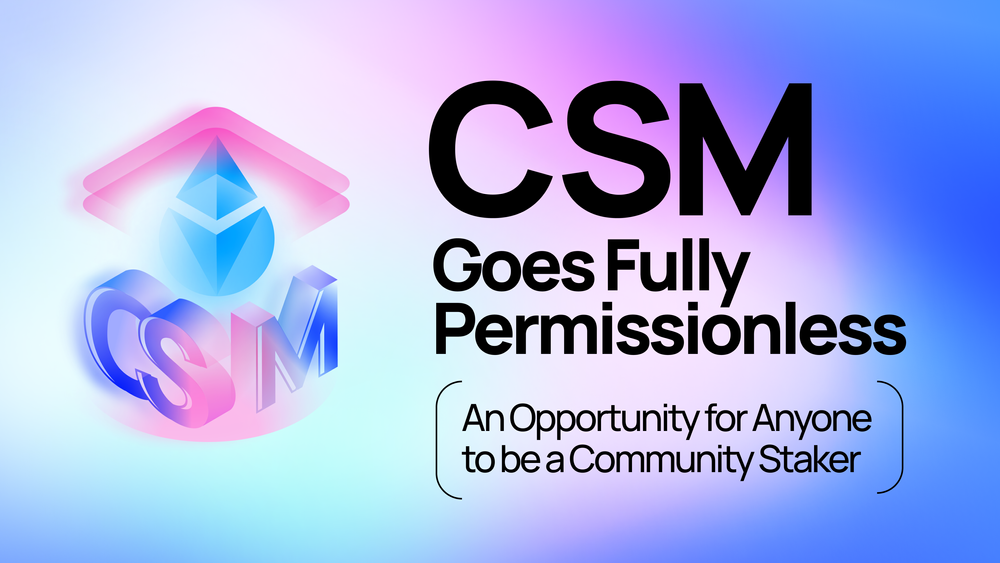CSM Goes Fully Permissionless

An Opportunity for anyone to be a Community Staker
The Lido Community Staking Module (CSM) has officially transitioned from its Early Adoption phase to being fully permissionless, as the on-chain vote was passed and enacted.
TLDR
- Anyone can now participate and submit their first validator key with just 2.4 ETH as bond, (those joining who are on the EA List can still submit their first one with just 1.5 ETH as bond). For subsequent validators, the required bond drops significantly to 1.3 ETH each.
- The 12-validators-per-node-operator limit has been removed, enabling independent Node Operators to scale their contributions freely and strengthen their impact on network decentralization.
- The module capacity has been increased to 2%, creating more room for independent operators to join, fostering greater diversification of the set of Node Operators using the Lido protocol.
What is CSM?
CSM is the first permissionless module in the Lido on Ethereum protocol, enabling any node operator - particularly community stakers, including independent stakers and home stakers, etc - to use the protocol to run validators by supplying an ETH-based bond. Designed to lower entry barriers, it empowers a broader range of operators to directly contribute to Ethereum’s security and constitutes a worthwhile proposition both for novice as well as experienced node operators.
Why Ethereum-Aligned Individuals Should Run CSM Validators
Running validators using CSM presents a unique opportunity for Ethereum supporters to actively contribute to the decentralization and security of both the network and the Lido protocol, with lower capital and technical requirements compared to traditional solo staking and other independent-staking enabling protocols.
- Further decentralizing the Lido protocol: Greater participation from community stakers running validators through CSM contributes to a larger, more distributed set of Node Operators and validators, further enhancing the protocol’s decentralization, resilience, and security.
- Additional Reward Use Cases for Independent Operators: Existing independent operators, such as vanilla stakers, DVT cluster members, or users of CSM-like solutions, can seamlessly operate CSM validators on their current infrastructure with minimal effort. Once their validators get deposited, they can potentially receive enhanced rewards for their idle ETH or staked ETH.
- Accessible Entry Point for New Stakers: For those who previously refrained from staking due to the 32 ETH requirement, CSM offers a more attainable entry point with only 2.4 ETH needed.
- Upskilling and Ecosystem Understanding: By joining CSM, participants in the Ethereum ecosystem gain valuable insights into the inner workings of Ethereum staking by operating a validator. This process deepens their understanding of Ethereum's core components while enabling them to potentially receive rewards comparable to those offered by DeFi protocols.
Early Adoption Benefits Are Still There
Even with the permissionless transition, existing Early Adoption members, as well as new CSM joiners whose address is in the EA list, retain the benefit of a discounted bond amount of 1.5 ETH for their first CSM validator.
What Has Happened Since Mainnet Launch?
The CSM mainnet launched around three months ago, on October 25, 2024, displaying remarkable growth during the Early Adoption phase:
- 330+ independent Node Operators joined CSM, increasing the overall count of Node Operators using the Lido protocol to 500+.
- CSM now constitutes ~0.65% of the Lido protocol‘s TVL with ~2,000 active validators. In addition to the portion of Simple DVT (i.e. 1.81%), approximately 2.5% of ETH staked via the protocol is staked with community stakers.
- 470+ validator keys are ready for ETH deposit, representing around 15,000 ETH that would further be staked with likely independent stakers.
- CSM Over Obol: 150+ Node Operators have organized themselves to run CSM validators using Obol DVT.
The growth of CSM is inseparable from the strong community engagement and contributions.
- Through the Lido Community Lifeguards Initiative, the Community Lifeguards have been engaging with communities and individuals worldwide to share educational content about community staking. This has increased interest among existing Ethereum users, contributors, and new explorers in becoming node operators, directly impacting modules like SDVT and CSM.
- Lido Community Staking Tribes Initiative: This initiative was launched to onboard employees and contributors of Web3 organizations into Ethereum solo staking. The first organization to participate was Drop, with four contributors in the process of becoming community stakers.
- CSM has been integrated into solutions such as DappNode, eth-docker, EthPillar, Nethermind Sedge, and Stereum to make it easier for operators to spin up, manage and monitor CSM validators.
What’s Next?
The CSM journey is far from over. Alongside permissionless entry, CSM contributors are hard at work on coming up with proposals for improving CSM to continue to reduce barriers to entry, enfranchise independent stakers, and drastically increase the percentage of stake operated permissionlessly via the Lido protocol.
Community involvement is essential for this, so be sure to participate in figuring out what lies ahead in CSM v2 by joining the research forum or Discord! Stay tuned for more updates!
Disclaimer: Network staking rewards are not guaranteed, vary and are dictated by the rules of the method for validating transactions, which are developed independently by the developers of each specific blockchain network and are not subject to modification by any liquid staking protocol. Past performance is not a reliable indicator of future results.